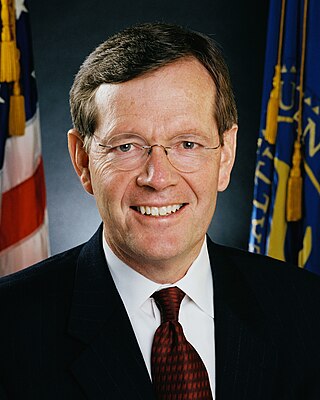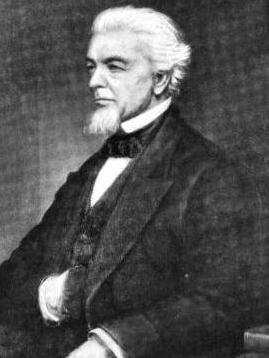
Michael Okerlund Leavitt is an American Republican Party politician who served as the 14th governor of Utah from 1993 to 2003, and in the George W. Bush administration as Administrator of the Environmental Protection Agency (EPA) from 2003 to 2005 and as Secretary of Health and Human Services (HHS) from 2005 to 2009.

William Wolcott Ellsworth was a Yale-educated attorney who served as the 30th governor of Connecticut, a three-term United States Congressman, a justice of the State Supreme Court.

Henrietta Swan Leavitt was an American astronomer. Her discovery of how to effectively measure vast distances to remote galaxies led to a shift in the scale and understanding of the scale and the nature of the universe. Nomination of Leavitt for the Nobel Prize had to be halted because of her death.
Robert Grandison Leavitt was an American track and field athlete, winner of 110 m hurdles at the 1906 Intercalated Games.

Roswell Leavitt Gilpatric was a New York City corporate attorney and government official who served as Deputy Secretary of Defense from 1961–64, when he played a pivotal role in the high-stake strategies of the Cuban Missile Crisis, advising President John F. Kennedy as well as Robert McNamara and McGeorge Bundy on dealing with the Soviet nuclear missile threat. Gilpatric later served as Chairman of the Task Force on Nuclear Proliferation in 1964.
Leavitt is an Anglo-Norman surname variant or surname and may refer to:
Mike or Michael Leavitt may refer to:

Elisha Leavitt (1714–1790) was a Hingham, Massachusetts, Loyalist landowner who owned several islands in Boston Harbor. During the Siege of Boston in 1775, Leavitt encouraged British forces to use one of his islands to gather hay for their horses, triggering one of the first skirmishes of the American War of Independence, The Battle of Grape Island. This encounter followed the battles at Lexington and Concord by a month, and preceded the Battle of Bunker Hill by less than a month.

Dr. Robert Greenleaf Leavitt (1865–1942) was an early American Harvard-educated botanist and widely published author in the field of botany, as well as an early college and high school educator in the natural sciences. Leavitt also worked for nine years as a botanical researcher at the Ames Botanical Laboratory in North Easton, Massachusetts.
Robert Keith Leavitt (1895–1967) was a Harvard-educated New York City advertising copywriter who turned to non-fiction writing. He was the author of many books, including a history of Webster's Dictionary and "The Chip on Grandma's Shoulder" (1954.) 'Bob' Leavitt was also the longtime historian of the original The Baker Street Irregulars, devoted to all things Holmesian, about which he wrote in his "The Origins of 221B Worship."

Mary Greenleaf Leavitt was an educator and successful orator who became the first round-the-world missionary for the Woman's Christian Temperance Union (WCTU). Setting out on virtually non-stop worldwide tours over a decade, she "went to all continents save Antarctica," where she crusaded against alcohol and its evils including domestic violence; and advocated for women's suffrage and other equal rights such as higher education for women. In 1891 she became the honorary life president of the World's WCTU.

The Blazo–Leavitt House is a historic house on Maine State Route 160 in Parsonsfield, Maine, United States. The large two-story house was built in 1812, and is one of the finest Federal period houses in northern York County. The house was listed on the National Register of Historic Places in 1982.
Frank McDowell Leavitt (1856–1928) was an American engineer and inventor. Leavitt devised one of the earliest machines for manufacturing tin cans and later invented the Bliss-Leavitt torpedo, the chief torpedo used by United States Navy in World War I. Leavitt was part of an emerging cadre of American engineers whose design feats were putting United States manufacturing might on the map at the dawn of the twentieth century.
The Emancipator (1833–1850) was an American abolitionist newspaper, at first published in New York City and later in Boston. It was founded as the official newspaper of the American Anti-Slavery Society (AASS). From 1840 to 1850, it was published by the Liberty Party; the publication changed names several times as it merged with other abolitionist newspapers in Boston.
Daniel or Dan Roberts may refer to:
Thomas Leavitt may refer to:
Greenleaf is a surname, and occasionally also a given name.

The sprint hurdles at the Summer Olympics have been contested over a variety of distances at the multi-sport event. The men's 110 metres hurdles has been present on the Olympic athletics programme since the first edition in 1896. A men's 200 metres hurdles was also briefly held, from 1900 to 1904. The first women's sprint hurdling event was added to the programme at the 1932 Olympics in the form of the 80 metres hurdles. At the 1972 Games the women's distance was extended to the 100 metres hurdles, which is the current international standard.

Norman Turner Leavitt was an American film and television actor.
This page is based on this
Wikipedia article Text is available under the
CC BY-SA 4.0 license; additional terms may apply.
Images, videos and audio are available under their respective licenses.








